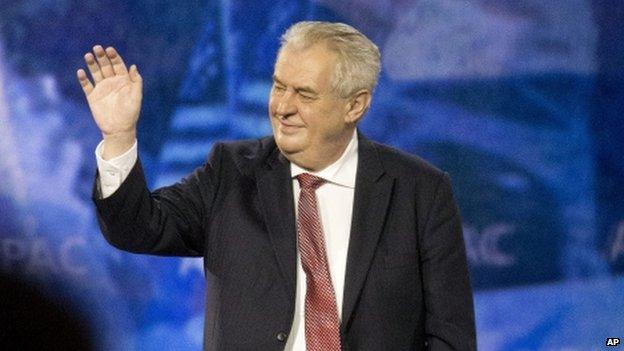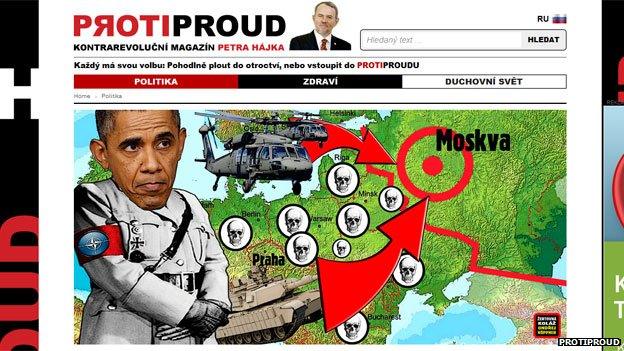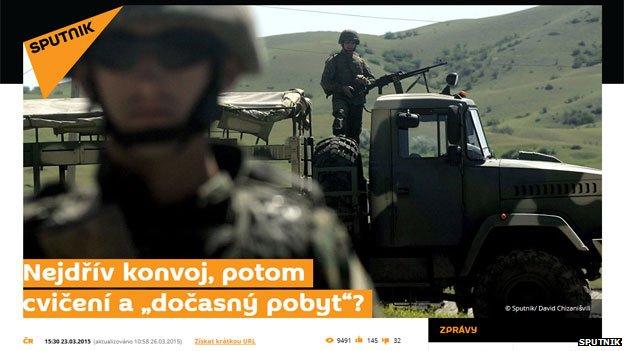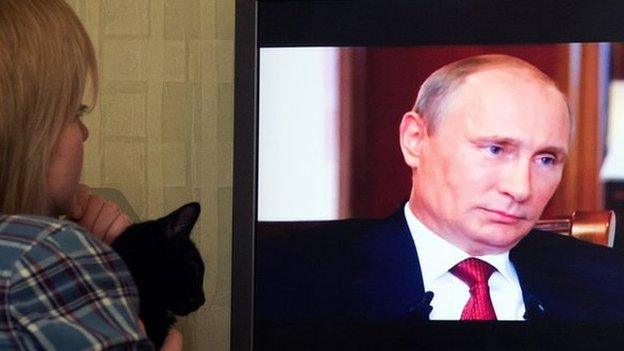Russian bid for Czech hearts and minds
- Published

The transit of US troops violates Washington's Nato pact, says one pro-Russian Czech site
Since the start of Ukraine crisis, the number of pro-Russian websites in Czech has mushroomed, prompting fears of a Kremlin propaganda campaign.
Only last month, Sputnik - the new name for the Kremlin-sponsored Voice of Russia - announced that it was launching a news website in Czech, external, with the declared aim of offering Czech readers "alternative views" on international issues.
But many Czechs over the age of 40 still have painful memories of the period between 1948 and 1989, when their country was locked into the Soviet bloc.
The brutal crushing of the 1968 Prague Spring by Soviet troops was a deeply traumatic experience for many Czechs and Moscow faces a stiff challenge in putting forward its viewpoint.
'Divided country'
The bulk of the Kremlin's propaganda effort is directed at the Baltic states, where there are sizeable Russian-speaking minorities and the message is delivered in Russian.
But the Russian government apparently also believes that there are political fissures worth exploiting in the Czech Republic, which joined Nato in 1999 and the European Union in 2004.

Czech President Milos Zeman has questioned EU sanctions on Russia
Sputnik quoted Igor Nikolaychuk of the Russian Institute of Strategic Studies as saying that the Czech Republic was "a divided country" and that there were separate tendencies pulling it in opposite directions, towards the Germanic and Slavonic worlds.
Czech President Milos Zeman has questioned the wisdom of EU sanctions on Russia in response to its intervention in Ukraine and is one of very few European leaders set to travel to Moscow in May for 70th anniversary celebrations marking the end of World War Two.
Impeccable Czech
Several mainstream Czech and Slovak media outlets have recently published lists, external of pro-Russian sites, which now run to several dozen. The combination of these sites' very professional appearance and their opaque ownership structure raises questions over how they are financed.
Czech journalist Vladimir Sevela, external, who investigated one such site, AENews, external, for independent news website Echo24, notes that contributions are anonymous and says that their tone recalls news reports put out by the occupying Soviet forces in 1968.
However, unlike the old Soviet reports, Mr Sevela adds, contributions to AENews are written "in impeccable Czech".

With its lurid graphics and screaming headlines, ProtiProud is one of the most extreme pro-Russian sites
Any media outlet with a tone reminiscent of Soviet propaganda is likely to alarm Czechs who remember the period.
Despite this, both Sputnik and the other pro-Russian sites push the argument that the Ukrainian government is a fascist regime and that the primary aim of the United States is world domination.

Sputnik claims that the transit of US troops is only the thin end of the wedge
The websites first began to appear after proposals were mooted for a greater Nato presence in eastern Europe. The recent transit of a Nato convoy through the Czech Republic became a focus for their criticism.
The convoy crossed the Polish-Czech border on 29 March and arrived at its destination in Germany on 1 April.
Anti-Nato activists called for protests against the convoy, and a recent AENews piece, external claimed that mainstream Czech media had been doing its utmost to "intimidate" anyone who might be thinking of taking part in such protests.
Contrarian
Earlier this month Sputnik's Czech site carried an article about the Nato convoy in which it quoted the words of Petr Hajek, who used to be an adviser to former Czech President Vaclav Klaus, also seen as sympathetic to the Russian cause.
Mr Hajek is known for having highly controversial views, and his "counter-revolutionary" blog ProtiProud , external(CounterCurrent) is one of the few Czech media outlets to carry signed articles with a stridently pro-Russian, anti-EU and anti-American stance.
According to Sputnik, external, Mr Hajek described the passage of the convoy as "a shocking display in line with the USA's imperialistic behaviour" and accused Nato of "actually preparing for war with Russia".
Despite the efforts of Mr Hajek and the pro-Russian websites to whip up anti-Nato sentiment, there appears to have been little evidence of widespread opposition to the convoy.
A recent opinion poll carried out on behalf of Czech TV, external found that 82% of those questioned had no objection to its transit through the country, while 57% of those polled considered public debate over the issue to be "an unnecessary fuss".
BBC Monitoring, external reports and analyses news from TV, radio, web and print media around the world. You can follow BBC Monitoring on Twitter , externaland Facebook, external.
- Published18 March 2015
